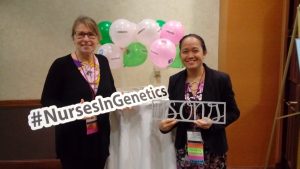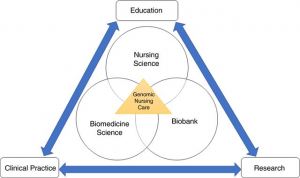Genomics – an Emerging Trend in Nursing Science – Genomiikka – nouseva suuntaus hoitotyössä
By: Anndra Parviainen, doctoral researcher, UEF
(Scroll down for the Finnish text)

Photo: Professor Katri Vehviläinen-Julkunen UEF and Doctoral researcher Anndra Parviainen UEF.
Genomics-Informed Nurses (GIN) played an important role in integrating genomics sciences, precision medicine and precision health into clinical practice (Laaksonen et al., 2022; National Academies of Sciences Engineering and Medicine, 2021; Tonkin et al., 2020). The ultimate goal of genomics is to improve patients’ outcomes (World Health Organization, 2020).
In this blog, I am going to share the reason why I took the courage to pursue my doctorate study in the topic of genomics. Genomics may be seen as hard science and may sounds foreign to nurses. As other healthcare fields are progressing so fast and embracing genomics, the nursing discipline seems to be stagnant and reluctant. The adaptation of genomics innovation in nursing discipline is slow. There are many reasons why we nurses are hesitant to embrace genomics. The main reasons are existing knowledge gaps, lack of training, and heavy workload (Buaki-Sogo & Percival, 2022; Bueser et al., 2022; Calzone et al., 2018; Zureigat et al., 2022).
For the sake of improving our craft (nursing science)– I personally believe that despite the many challenges in our nursing profession, we can be part in the genomics revolution. Or should I say that “we should be part and not be left behind”.
The story of my genomics journey
Eight years ago, a very close relative of mine called me and informed me the sad news that healthcare professionals are considering the possibility that my relative is having a certain type of cancer. This personal experience in life had given me motivation to search for knowledge about cancer.
During my first year as master’s degree student in University of Eastern Finland, Department of Nursing Science, I took that opportunity to learn and discover what do we mean by cancer. I have taken courses related to cancer and one of these courses is Cancer Genomics taught by Prof. Carsten Carlberg from UEF, Biomedicine Institute. I feel fascinated with the topic and the take home message from this course was “the more we know cancer in a genomic way, the more we are prepared”.
When I am on my second year of my master’s degree, we had this course “Evaluation of Nursing Knowledge” and Prof. Katri Vehviläinen-Julkunen presented the broad scope of the nursing disciple from macro-level to genomic-level. I feel happy to know that genomics is still within the scope of nursing discipline. I was sure to myself that I want to pursue my doctorate degree (started 2017) to continue to search and discover new things.
I was reflecting with my own personal life experiences and my passion to contribute to advancing the nursing science as a discipline. I was thinking during that time that I want to explore the possibility of genomics be integrated in the nursing profession while learning the methodology of performing interventional studies like randomized-controlled trial as a research method. I took the doctoral degree as an opportunity to learn from the experts and great mentors.
Addressing the knowledge gaps among nurses and introducing the genomics concepts is a practical way for the nursing science progress smoothly in the nursing education, clinical application, and research. I hope that this humble study would spark interest among nurses.

Figure. Conceptual framework of genomic nursing care. Three overlapping disciplines — nursing science, biomedicine science, and biobank—build a career in Genomic Nursing Care, which is central to the circles representing the complex concepts and skills necessary to nursing career development – © Dumo et al., 2020.
Save the date: 1st Genomics-Informed Nursing Symposium on March 15-16, 2023 in Kuopio, Finland
Let me take this opportunity to invite you to the 1st Genomics-Informed Nursing Symposium that will be organized in collaboration with University of Eastern Finland, Faculty of Health Sciences, Department of Nursing Science and Tampere University of Applied Sciences and GenoNurse Project on March 15-16, 2023 in Kuopio, Finland. More information of the event https://sites.uef.fi/gin-symposium2023/
The event is suitable for healthcare professionals, students, teachers, researchers and anyone interested in the topic. Register here: https://link.webropolsurveys.com/S/0F17693FCE2B8873
I wish you all happy holidays and Hyvää Itsenäisyyspäivää! Happy 105th years of Independence Day Finland
Anndra Parviainen (Dumo)
Department of Nursing Science
University of Eastern Finland
Genomiikka – nouseva suuntaus hoitotyössä
Tekijä: Anndra Parviainen, tohtoritutkija, UEF

Kuva: Professori Katri Vehviläinen-Julkunen (UEF) ja Väitöskirjatutkija Anndra Parviainen (UEF).
Genomics-Informed Nurses (GIN) oli tärkeä rooli genomiikkatieteiden, täsmälääketieteen ja täsmäterveyden integroinnissa kliiniseen käytäntöön (Laaksonen ym., 2022; National Academies of Sciences Engineering and Medicine, 2021; Tonkin ym., 2020). Genomiikan perimmäinen tavoite on parantaa potilaiden tuloksia (World Health Organization, 2020).
Tässä blogissa aion jakaa syyn, miksi uskalsin jatkaa tohtoriopintojani genomiikan aiheesta. Genomiikka voidaan nähdä kovana tieteenä ja saattaa kuulostaa vieraalta sairaanhoitajille. Kun muut terveydenhuollon alat edistyvät niin nopeasti ja kattavat genomiikan, hoitotyön kurinalaisuus näyttää olevan pysähtynyt ja vastahakoinen. Genomiikan innovaatioiden sopeutuminen hoitotyön alalla on hidasta. On monia syitä, miksi me sairaanhoitajat epäröimme omaksua genomiikkaa. Tärkeimmät syyt ovat olemassa olevat tiedon puutteet, koulutuksen puute ja raskas työtaakka (Buaki-Sogo & Percival, 2022; Bueser et al., 2022; Calzone ym., 2018; Zureigat et al., 2022).
Ammattimme (sairaanhoitajatieteen) kehittämisen vuoksi uskon henkilökohtaisesti, että sairaanhoitajan ammattimme monista haasteista huolimatta voimme olla mukana genomiikan vallankumouksessa. Vai pitäisikö minun sanoa, että “meidän tulee olla osa eikä jäädä jälkeen”.
Tarina genomiikan matkastani
Kahdeksan vuotta sitten eräs hyvin läheinen sukulaiseni soitti minulle ja ilmoitti suru-uutisen, että terveydenhuollon ammattilaiset harkitsevat mahdollisuutta, että sukulaisellani on tietyntyyppinen syöpä. Tämä henkilökohtainen elämänkokemus oli antanut minulle motivaatiota etsiä tietoa syövästä.
Ensimmäisen vuoden aikana Itä-Suomen yliopiston Hoitotieteen laitoksen maisteriopiskelijana käytin tilaisuutta hyväkseni oppiakseni ja selvittämään, mitä syövällä tarkoitetaan. Olen käynyt syöpään liittyviä kursseja ja yksi näistä kursseista on Cancer Genomics, jota opettaa Prof. Carsten Carlberg UEF:stä, Biomedicine Institutesta. Aihe kiehtoo minua ja tämän kurssin kotiviesti oli “mitä enemmän tunnemme syövän genomisella tavalla, sitä paremmin olemme valmiita”.
Kun olen toista vuotta opiskellessani, meillä oli tämä kurssi “Hoitotyön tietämyksen arviointi” ja Prof. Katri Vehviläinen-Julkunen esitteli hoitotyön oppilaan laajaa ulottuvuutta makrotasolta genomitasolle. Olen iloinen saadessani tietää, että genomiikka kuuluu edelleen hoitotyön alaan. Olin itselleni varma, että haluan jatkaa tohtorin tutkintoa (alkoi 2017) jatkaakseni uusien asioiden etsimistä ja löytämistä.
Mietin omia henkilökohtaisia elämänkokemuksiani ja intohimoani olla mukana edistämässä hoitotieteen alaa. Ajattelin tuolloin, että halusin tutkia mahdollisuutta integroida genomiikka sairaanhoitajan ammattiin samalla kun opin interventiotutkimusten, kuten satunnaistetun kontrolloidun kokeen, suorittamisen metodologiaa tutkimusmenetelmänä. Otin tohtorin tutkinnon tilaisuuteni oppia genomiikan asiantuntijoilta kansainvälisesti ja mahtavilta mentorilta.
Sairaanhoitajien tietopuutteiden korjaaminen ja genomiikan käsitteiden esittely on käytännöllinen tapa hoitotieteen sujuvaan etenemiseen hoitotyön koulutuksessa, kliinisissä sovelluksissa ja tutkimuksessa. Toivon, että tämä vaatimaton tutkimus herättäisi kiinnostusta sairaanhoitajien keskuudessa.

Kuva. Genomisen hoitotyön käsitteellinen viitekehys. Kolme päällekkäistä tieteenalaa – hoitotiede, biolääketiede ja biopankki – rakentavat uraa Genomic Nursing Care -alalla, joka on keskeinen piireissä, jotka edustavat sairaanhoitajan urakehitykseen tarvittavia monimutkaisia käsitteitä ja taitoja – © Dumo et al., 2020.
Tallenna päivämäärä: 1. Genomics-Informed Nursing Symposium 15.-16.3.2023 Kuopiossa
Käytän tilaisuutta hyväkseni ja kutsun sinut 1. Genomics-Informed Nursing Symposiumiin, joka järjestetään yhteistyössä Itä-Suomen yliopiston Terveystieteiden tiedekunnan Hoitotieteen laitoksen ja Tampereen ammattikorkeakoulun sekä GenoNurse Project kanssa 15. maaliskuuta. 16.2023 Kuopiossa. Lisätietoja tapahtumasta https://sites.uef.fi/gin-symposium2023/
Tilaisuus sopii terveydenhuollon ammattilaisille, opiskelijoille, opettajille, tutkijoille ja kaikille aiheesta kiinnostuneille. Rekisteröidy täällä: https://link.webropolsurveys.com/S/0F17693FCE2B8873
Hyvää itsenäisyyspäivää 105 vuotta Suomi!
Hoitotieteen laitos
Itä-Suomen yliopisto
References:
Buaki-Sogo, M., & Percival, N. (2022). Genomic medicine: The role of the nursing workforce. Nursing Times [Online], 118(8), 1–3. https://cdn.ps.emap.com/wp-content/uploads/sites/3/2022/07/220713-Genomic-medicine-the-role-of-the-nursing-workforce.pdf
Bueser, T., Skinner, A., Skinner, T. B. A., Saghdaoui, L. B., & Moorley, C. (2022). Genomic research : The landscape for nursing. Journal of Advanced Nursing, 78(July), e99–e100. https://doi.org/10.1111/jan.15396
Calzone, K. A., Kirk, M., Tonkin, E., Badzek, L., Benjamin, C., & Middleton, A. (2018). The global landscape of nursing and genomics. Journal of Nursing Scholarship, 50(3), 249–256. https://doi.org/10.1111/jnu.12380
Dumo, A. M., Laing, B., Lim, A. G., Palaganas, E., Abad, P. J., Valdehueza, O., Palovaara, M., Saunders, H., Estola, M., Mandysova, P., Maguire, J., Ward, L. D., Carlberg, C., & Vehviläinen-Julkunen, K. (2020). Randomized controlled trial on the effectiveness of web-based genomics nursing education intervention for undergraduate nursing students: A study protocol. Journal of Advanced Nursing, 76(11), 3136–3146. https://doi.org/10.1111/jan.14477
Laaksonen, M., Airikkala, E., & Halkoaho, A. (2022). The development of education of public health nurses for applying genomics in preventive health care. Frontiers in Genetics, 13(April), 1–6. https://doi.org/10.3389/fgene.2022.849232
National Academies of Sciences Engineering and Medicine. (2021). The future of nursing 2020-2030: Charting a path to achieve health equity. The National Academies Press. https://doi.org/10.17226/25982
Tonkin, E., Calzone, K. A., Badzek, L., Benjamin, C., Middleton, A., Patch, C., & Kirk, M. (2020). A roadmap for global acceleration of genomics integration across nursing. Journal of Nursing Scholarship, 52(3), 329–338. https://doi.org/10.1111/jnu.12552
World Health Organization. (2020). Human Genomics in Global Health. WHO. https://www.who.int/genomics/geneticsVSgenomics/en/
Zureigat, B., Gould, D., & Seven, M. (2022). Educational interventions to improve nurses’ competency in genetics and genomics: A scoring review. Journal of Continuing Education in Nursing, 53(1), 13–20. https://doi.org/10.3928/00220124-20211210-06